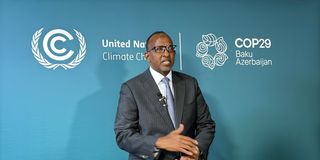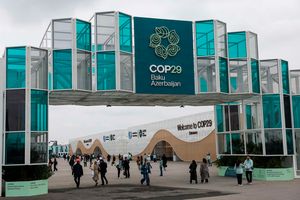African nations need grants, not loans, for climate action: Duale at COP29

Environment and Climate Change Cabinet Secretary Aden Duale at COP29 in Baku, Azerbaijan.
What you need to know:
- Kenya’s presence was felt strongly despite President William Ruto’s absence. Representing him were Musalia Mudavadi, the Prime Cabinet Secretary, and Environment and Climate Change CS Aden Duale.
In Baku, Azerbaijan
On the second day of COP29, the vibrant city of Baku played host to a gathering of 80 heads of state, government officials and influential world leaders. Their collective presence established a decisive tone for the climate negotiations that were set to unfold over the next 10 days, highlighting the urgency and importance of addressing global climate challenges.
António Guterres, the secretary-general of the United Nations, emphasised to the leaders in attendance that “time is not on our side.”
“We are in the final countdown to limit global temperature rise to 1.5 degrees Celsius. And time is not on our side,” he said.
The secretary-general urged countries party to the United Nations Climate Change Convention to deliver on the national ambition and action. “Only you can beat the clock by 1.5 degrees Celsius.”
The 1.5°C threshold is significant because scientific research indicates that going beyond it would result in severe and potentially irreversible impacts on the environment, ecosystems and human societies
Each leader who took to the podium painted an image of the negative impacts of climate change in their countries. For African leaders present, it was a date with the biggest polluters and they used the chance to remind them of their commitments to pay for climate change.
Least polluter
According to the World Health Organization, Africa is the least polluter, but the most vulnerable to the impacts of climate change.
The catastrophe that hit Libya 14 months ago in the city of Derna is the pain that Mohamed Menfi, the president of Libya, carried to the podium. “We have been experiencing climate change, not through predictions but from living with spreading natural catastrophes. Even that, we have seen who have been starting wars to expand the damage on Earth, instead of working together to face the threats of climate change,” he remarked.
Kenya’s presence was felt strongly despite President William Ruto’s absence. Representing him were Musalia Mudavadi, the Prime Cabinet Secretary, and Environment and Climate Change CS Aden Duale.
“When we were in Nairobi, the President chaired a session and we were able to get the Nairobi Declaration with the direction and the agenda for the African continent. Now, these countries need actual support and therefore the re-engineering. What we need to get out of here is the re-engineered financial products which are concessionary, which do not have many complications for disbursements so that the countries can start their plans on environmental actions,” he said.
CS Duale reiterated Kenya’s longstanding position: the countries most responsible for greenhouse gas emissions must assume greater responsibility and provide substantial financial support to developing countries for climate adaptation and mitigation.
“There must be an agreeable, proper, sustainable financing, whether it is financing of adaptation, mitigation and sustainable development. And that financing must be in the form of grants, not commercial because the choice we have now in our country, for example, is between dealing with the effects of climate change and dealing with the effect of that burden,” he offered.
Speaking on Africa's stance, there are irreducible minimums that they hope to present to wealthy nations. On matters of financing, the CS said that an agreement made in Copenhagen, Denmark where rich countries agreed to pay 100 billion dollars, was not achieved. “There was no mechanism of tracking the funds,” he said.
The new ask - the common call for all African countries - is a new financing mechanism of 1.3 trillion US dollars by 2030. “We are the victims. And the polluters are here, so we want them to pay the victims,” he added.
Further, CS Duale announced that Kenya has passed the Climate Act amendment and the carbon market regulations. Its other reason for being at the COP is that it is asking for the operationalisation of Article 6 of the Paris Agreement.
“I am remaining with another three regulations. There are many investors who want to do carbon offset projects and carbon credit projects. So for us to do that, for us to put the relevant laws and regulations for our communities and our people to benefit from the carbon credit transfers and the carbon credit projects, then Article 6 of the Paris Agreement must be actioned,” he said.
This section, contained in the Paris Agreement—an international climate change treaty adopted by nearly every country in 2015- provides a pathway for countries to work together, using both market and non-market mechanisms, including international carbon trading.
Yesterday, countries represented at the COP approved new standards for international carbon markets that will enable countries to trade high-quality carbon credits through the carbon credit market.
This system allows polluters to emit carbon dioxide or other gases and pay communities to capture the emissions.
However, the subject of carbon credits is largely controversial, with some opponents arguing that they have damaging consequences for local communities.
“If you look at the carbon trading, the carbon market regulations that were passed by the parliament a month ago, it’s in that regulation that 40 per cent of any carbon projects done in any place in our country will go to the local community in terms of education, healthcare, and making sure that water is available. So, unlike before the Climate Act, carbon market trading that was going on in Kenya was involuntary. Now with the law, we have introduced what is called compliance. Everybody must comply with the law,” he said.





